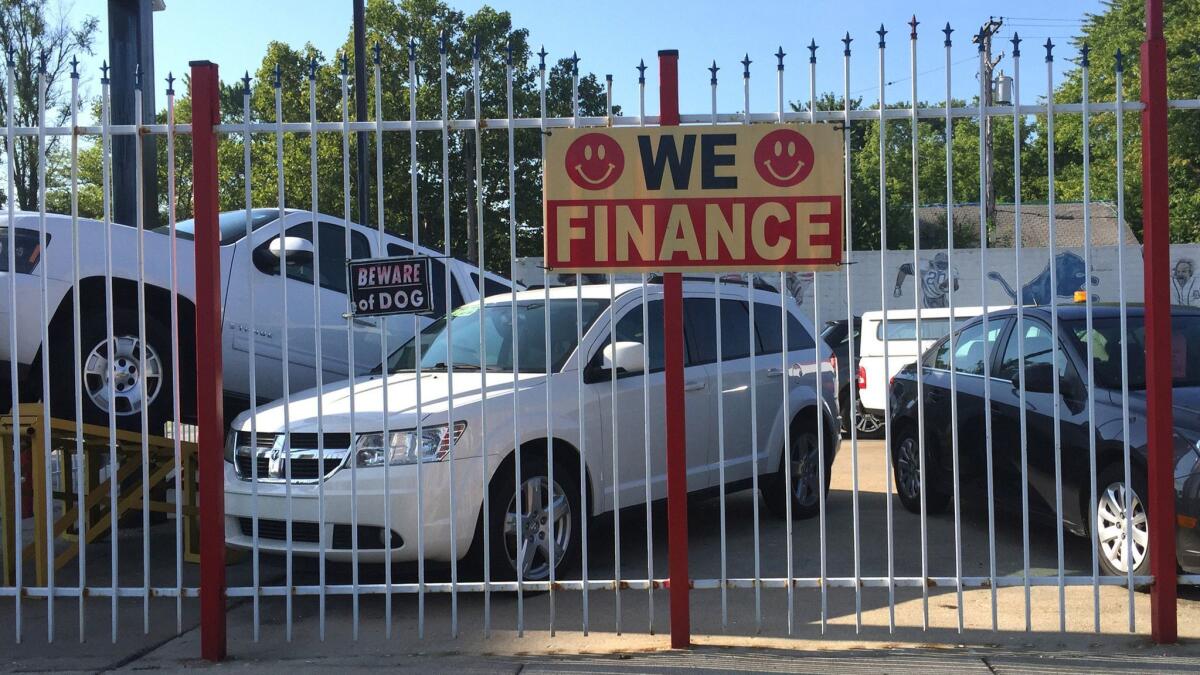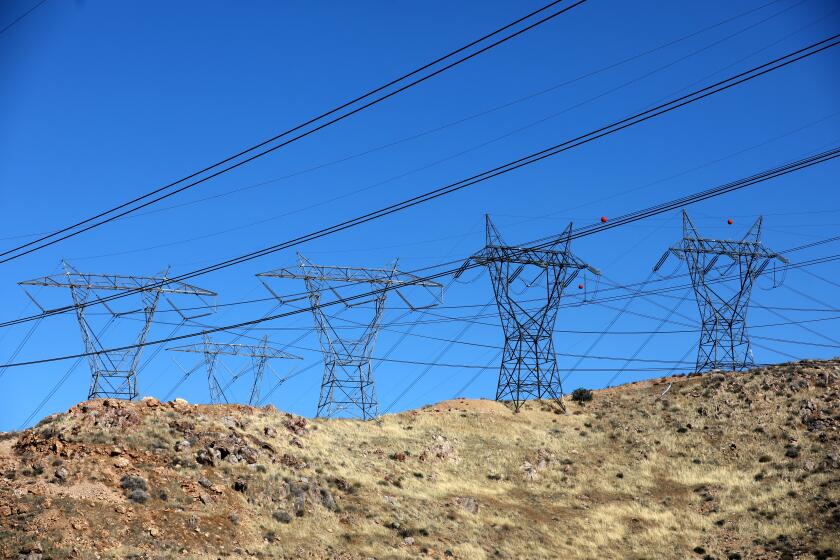The economy is booming. But are Americans ready for the next recession?
- Share via

Need a few thousand bucks? Get a loan fast online. Need a mortgage? Apply for one on your phone. Have questions for your bank? Chat with a robot instead of a teller.
The way Americans interact with the financial system has changed dramatically over the last 10 years. And yet, for all the technological innovation, Americans’ fundamental relationship with the institutions that help them pay for homes, cars and other necessities remains largely unchanged.
A decade after the financial crisis, many households are no more prepared for an economic downturn today than they were then. And though there’s less risky lending in some areas, new worries have emerged.
Student and auto debt have soared, new types of loans backed by untested technology have hit the market and the average American has benefited little from the roaring stock and housing markets.
“There are more people on the margins than there were in 2008,” said Mehrsa Baradaran, an associate dean at the University of Georgia School of Law who has written extensively about wealth inequality and the financial system. “More people have been knocked out of the secure middle class. I think the next crisis will hurt as much if not more.”
One worrisome sign is that, when a crisis or recession comes — and experts agree it’s a question of when, not if — Americans will probably be in just as much debt as they were in 2008, if not more.
In the third quarter of 2008, U.S. household debt peaked at $12.7 trillion. After falling for a few years, debt started to rise again. Today, that figure stands at $13.3 trillion.
The figures aren’t adjusted for inflation or population growth, but they nevertheless show that Americans, after cutting back, are borrowing again.
And more than ever, they’re borrowing in the form of student loans as the cost of higher education has far outpaced inflation.
Since mid-2008, mortgage, home equity and credit card debt have shrunk while the amount of student debt has more than doubled. The increase in student debt accounts for nearly all of the increase in overall household debt.
Despite the growth, investors aren’t worried about student loans taking down the financial system. Bankruptcy laws make it nearly impossible to shed student loans, and the federal government, rather than banks or private investors, owns most of it.
Still, investors are concerned that high monthly payments could have long-term effects on the economy, potentially stunting its growth.

Saddled by student debt and graduating into an economy in which jobs have returned but wages have been stagnant, many younger Americans haven’t been able to afford to save for down payments and buy homes, forcing them to rent. That has pushed up rental prices, making it even harder to save, said Andrew Hsu, a portfolio manager at downtown Los Angeles investment firm DoubleLine Capital.
“It creates this cycle where, in this race of trying to buy a home, they can’t catch up,” he said.
What’s more, those would-be buyers have now missed out on years of a booming housing market. Even if they could buy now, they might be buying near the top of the market and won’t benefit from the last few years of swift price appreciation.
“People who didn’t have the funds to buy, they missed out on a massive rally,” Hsu said.
The only other type of debt that’s increased is for auto loans, which has climbed 53% since 2008 to $1.2 trillion. And there too, investors see cause for concern. Over the last few years, lenders have increasingly lent to borrowers with weak credit scores and offered loans with longer terms, allowing borrowers to pay for cars over as long as seven years.
Hsu noted that delinquencies on auto loans have ticked upward, a sign that’s particularly ominous because borrowers in the past have tended to make their car payments a priority for fear of losing their wheels.
“With increasing delinquencies in the space, perhaps we’re reaching the top of a cycle,” Hsu said. “It could be a potential red flag.”
Another worry for investors is the rise of online lending. Over the last few years, so-called fintech companies such as Lending Club and Prosper have issued tens of billions of dollars in loans to consumers who wanted to refinance other loans, pay off credit cards or make home improvements.
But nearly all those online loans were made as the economy has recovered from the recession. In 2007 and 2008, industry leader Lending Club made a mere $25 million in loans. So far this year it’s lent $3.8 billion. Investors say they’re not sure how these new types of loans will perform in a downturn.
“The models are not recession tested,” said Tad Rivelle, chief investment officer for fixed income at downtown L.A. investment firm TCW. “They have a high degree of faith that the algorithm will give the right answer. But the algorithm can be fooled.”

Mark Hamrick, senior economic analyst at consumer finance site Bankrate.com, said one risk inherent in the rise of online financial services is that consumer protections and warnings are often buried in electronic documents that few people read.
“Years ago, many financial products were attained through personal interaction and in that process there was at least some back-and-forth communication — is this credit card good for me?” he said. “Now we all just click the box to get to the next page.”

Even in the mortgage market, where there’s less outstanding debt than in 2008, there’s still plenty of risk to go around.
Though exotic subprime loans — such as option ARMs, with adjustable rates and payment plans — offered by the likes of Countrywide and Ameriquest are gone, borrowers with bad credit or little savings for a down payment are still getting home loans. The difference is that now those loans are made through the Federal Housing Administration mortgage-insurance program or are otherwise government-backed.
In 2005 and 2006, the peak years before the crash, government-backed loans accounted for only about 35% of all new mortgages; by last year, that figure had risen to 70%, according to the Urban Institute.
Rivelle said that means a meltdown in the mortgage market probably won’t cause the same damage as the last one because banks and private investors are less exposed.
“If you want to be an optimist, if there's a blowup in the housing market it will not impact the banks the way it did in the last cycle,” he said. “But there has been a marked deterioration in the quality of loans.”
Have you rebounded? Track the recovery of home prices in Southern California »
Kim Schoenholtz, a professor at New York University’s Stern School of Business, said these risky, largely government-backed loans are a sign that, despite a housing-led recession and financial crisis, U.S. policymakers are still incentivizing home ownership to a dangerous degree.
FHA loans and other programs, he said, encourage people to try to build their nest eggs not by investing in the stock market or saving but by plowing money into a single piece of real estate.
“We’re encouraging people to adopt very risky financial behavior — to acquire an illiquid, undiversified asset and to borrow heavily against it,” he said.
Overall, Baradaran said Americans are no better prepared for a recession than they were in the run-up to 2008. But the University of Georgia professor also said that’s not because consumers are trying to engage in risky behavior.
Sure, student debt has boomed, she said, but that’s because Americans have no other way to pay for college and try to nab jobs with decent pay in an economy in which wages are stagnant for many.
About one-quarter of U.S. adults have no retirement savings, according to a 2017 household financial survey by the Federal Reserve, and 41% say they would not have enough savings to cover a $400 emergency expense.
“I think a lot of people did learn their lesson, but people need student loans to go to college,” Baradaran said. “These aren’t greedy people. They’re not gamblers. I don’t think everyone is making bad decisions.”
Follow me: @jrkoren
Additional credits: Animated graphics by Swetha Kannan. Produced by Justin L. Abrotsky.
Inside the business of entertainment
The Wide Shot brings you news, analysis and insights on everything from streaming wars to production — and what it all means for the future.
You may occasionally receive promotional content from the Los Angeles Times.








